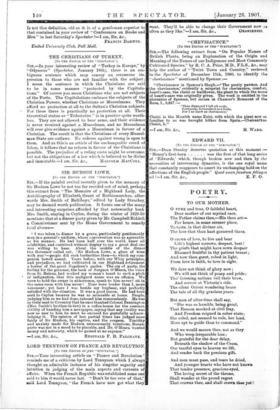SIR HUDSON LOWE.
[To THE EDITOR OP TEE "SPECTATOR."]
SIR,—If the painful revival recently given to the memory of Sir Hudson Lowe be not too far receded out of mind, perhaps this extract from "The Memoirs of a Highland Lady, the Autobiography of Elizabeth Grant of Rothiemurchus, after-
wards Mrs. Smith of Baltitoys," edited by Lady Strachey, may be deemed worth publication. It forms one of the many and interesting surprises afforded by that noteworthy book Mrs. Smith, staying in Ceylon, during the winter of 1829-30. mentions that at a dinner party given by Mr. Campbell Riddell, a Commissioner sent by the Home Government to remedy local abuses-
" I was taken to dinner by a grave, particularly gentlemanly man in a general's uniform, whose conversation was as agreeable as his manner. He had been half over the world, knew all celebrities, and contrived without display to say a great deal one was willing to hear. About the middle of the dinner the Governor called out, Sir Hudson Lowe, a glass of wine with you '—people did such barbarities then—to which mycom- panion bowed assent. Years before, with our Whig principles, and prejudices, we had cultivated in our Highland retirement a horror of the great Napoleon's gaoler. The cry of party, the feeling for the prisoner, the book of Surgeon O'Meara, the voice from St. Helena, had worked my woman's heart to such a pitch • of indignation, that this maligned name was an offence. We were to hold the owner in abhorrence, speak to him never ! sit in the same room with him never ! None were louder than 1, more vehement; yet here I was beside my bugbear, and perfectly satisfied with the situation. It was a good lesson. He had been sent to Ceylon because he was so miserable at home. People, judging him as we had done, tabooed him remorselessly. He was so truly sent to Coventry that he once thanked Colonel Pennington (Mrs. Smith's brother-in-law) in a coffee-house for the common civility of handing him a newspaper, saying that any civility was now so new to him he must be excused for gratefully acknow- ledging it. The opinion of less partial times has judged more fairly of Sir Hudson, his captive, and the surgeon. Timidity and anxiety made Sir Hudson unnecessarily vexatious, Buona- parte was not in a mood to be placable, and Mr. O'Meara wanted money and notoriety, which he gained at no expense."
am, Sir, &c., REGINALD F. D. PALGRAVE.


















































 Previous page
Previous page